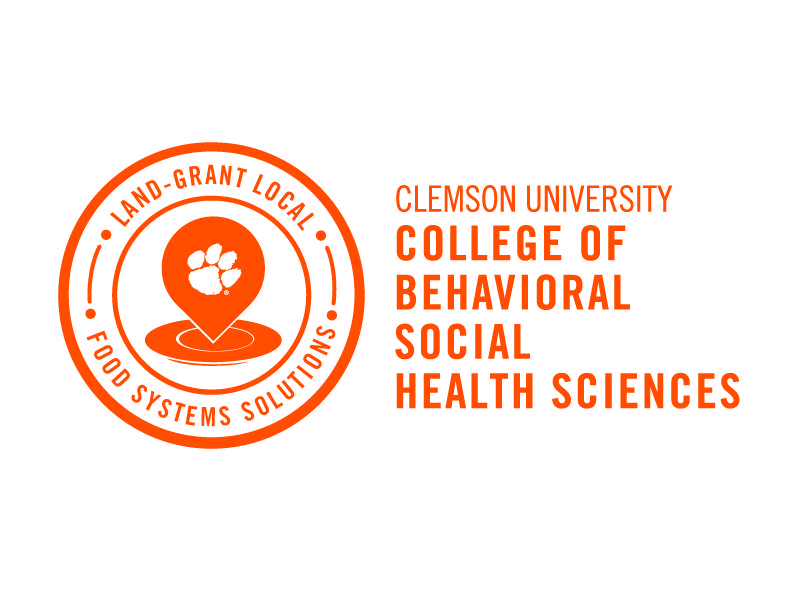CLEMSON — Clemson’s College of Behavioral, Social and Health Sciences has established a new program, Land-Grant Local, that will enhance economic, social and health outcomes in South Carolina by more fully integrating the work of local farms into Clemson University.
The program’s immediate goal is to factor foods from local farms into the Clemson environment, but college leadership and faculty are already shaping future curriculum and research centered on food systems that stress solutions for food insecurity and hunger across the state.
Leslie Hossfeld, dean of the College of Behavioral, Social and Health Sciences, said the program is a logical next step for the college after its involvement in events centered on food research, such as 2019’s FoodFORWARD research symposium, and its broader efforts in the area of rural health outreach. Hossfeld said the benefits of taking advantage of farms in close proximity to Clemson go far beyond the tastebuds.
“Improving access to local foods has an immediate effect on health, but it also helps to stimulate the South Carolina economy, build relationships across communities and introduce a model that other areas can emulate,” Hossfeld said. “Pursuing a program such as Land-Grant Local further positions us as a 21st century land-grant college dedicated to teaching, research and service to the state.”
A program of this type is not a first for Hossfeld, who previously served as director of the Mississippi Food Insecurity Program and associate director of the Myrlie Evers-Williams Institute for the Elimination of Health Disparities during her time as professor and head of the sociology department at Mississippi State University. At the University of North Carolina Wilmington, Hossfeld started the Southeastern North Carolina Food Systems Program. The program created a food hub for local, socially disadvantaged farmers and linked farm to institution and throughout UNCW’s Campus Dining.
Hossfeld said one of her primary goals upon arriving at Clemson was to create a program aimed at food insecurity and food systems research.
“I know how much work goes into getting a program such as this one off the ground,” Hossfeld said. “It takes years of relationship building so that every farmer, faculty member, student and community member involved can come together and get the most out of the program.”

Hossfeld said the appointment of Mike McGirr as director of Land-Grant Local allows the college to skip many steps in the relationship-building needed for the role. McGirr previously served as executive director of Feed & Seed, a nonprofit collaborative organization seeking to increase food security for all South Carolinians.
As the director of Land-Grant Local, McGirr will work directly with Hossfeld and partner with Clemson’s College of Agriculture, Forestry, and Life Sciences and other entities to develop, nurture and create food systems initiatives at the university. McGirr will bring together an interdisciplinary service-learning, facilities and community-programmatic team focused on food systems.
“I know Clemson just as well as I know the farmers and the consumers that exist in and around it,” McGirr said. “I’ve been engaged for years in measuring the need for local foods in the region as well as measuring the institutional and infrastructure gaps in the system that keep us from having local foods in a profitable and sustainable fashion.”
McGirr said that in the short term, he plans to focus on the “low-hanging fruit, dairy, meat and vegetable products” that can be easily factored into Clemson’s campus. Throughout this process, McGirr will work with Clemson faculty to research the economic, social, communication and health factors that will allow the college to make the case that local food sourcing can and should continue.
“Farmers don’t just grow stuff in the hopes it will sell,” McGirr said. “What I can bring to them is the mechanism to wash, sort, pack and label it to get it into the hands of an institution, and we want to build that to the specifications of Clemson. We want to program exactly what an institution the scale of Clemson University would like to purchase on a seasonal basis from farmers.”
According to Hossfeld, the real power of the program will come from students seeing it in action across the campus while attending classes and engaging in research that illuminate the bigger picture of food systems in the state. Hossfeld said if it can be done at Clemson, it can be scaled and accomplished in communities hit hardest by food insecurity and lack of access to healthy foods.
“Our vision is a fully integrated food system that exists across the university that can act as a model for other universities and communities across the state and beyond,” Hossfeld said. “We’re partnering with anyone who can bring their expertise in food systems to the table. When we pull our resources together, we can reduce waste, increase economic benefits, improve health outcomes and address hunger while creating and enhancing student learning, teaching and research.”
For more information on Land-Grant Local, visit http://bit.ly/LandGrantLocal.
Get in touch and we will connect you with the author or another expert.
Or email us at news@clemson.edu



